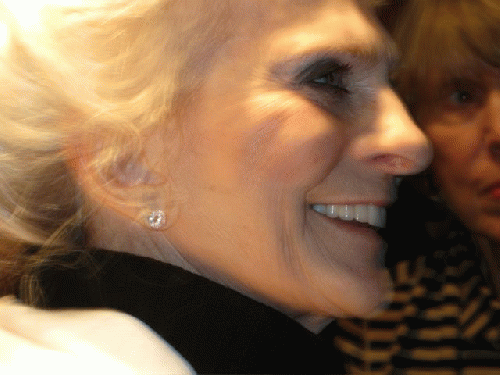Judy Collins may have aged, but her voice hasn't.
"Both Sides Now" was her first offering at Princeton's McCarter Theatre Friday, February 19, a block of seats having been reserved by the Coalition of Peace Action for idealist groupies and other elitists, but less assuming than many.
Judy's theme song has evolved, just different enough from the original to make me nostalgic, not for the confusion of the times when she sang it the way we all loved it, but for what happened back then: an educated youthful public materialized the best of all possible theoreticals they were studying in college.
Of course the politics of the time, so liberal at the domestic level, played a role: the dreams of MLK, women who craved freedom from the bondage of the Desperate Housewives, experimental lifestyles that survive today only in remote fringes of our terrain, The Civil Rights Act, the Voting Rights Act, secession of right-wing southerners from the Democratic Party, and the sacrificial deaths of two Kennedys and MLK, among other activist heroes.
After that magic decade, most of the hippies donned white collars and moved to the "burbs to create families.
As I've said again and again, conservatives were unnerved by all we had accomplished, most astutely isolated education as the catalyst and slowly and insidiously dumbed down subsequent generations, with Sarah Palin the ultimate fleur du mal of this process.
*****
Judy's voice sang other beautiful songs. She accompanied herself with her steel-stringed guitar, sang solo, sang accompanied by a wonderful pianist, and then, after intermission, disciplined her hair, pinning it up in a graceful bun, and sat down at the piano and sang with it.
Woven into this fabric were anecdotes of her life, from her renunciation of Mozart and soloing with orchestras at age 12 to folk singing. She sang her father's songs. She recalled her beginnings in the Village in the early sixties, joining those twentieth-centuries elite resurrections of the French Baudelaires, the early-twentieth-century imagists, the mid-century coterie of Sartre, Stein-Toklas, and de Beauvoir, all avant-garde visionaries--how can I leave out the beatniks, Alan Ginsburg and Jack Kerouac and their folks, all of whom sort of melted into the hippies and then disappeared.
There was grungy Bob Dylan as Judy first saw him sitting at a bar, aloof; there was Joan Baez, Buffy St. Marie, the whole Kum Ba Ya set I was slightly too young to appreciate.
They ushered in that magic time of my first foray into the outside world. "Farewell, Womb!" I had bid my mother.
I couldn't help but recall that it was in the same Princeton theater that I had first heard Joan Baez and a first, distant drumbeat that something was happening there, that the times they were a'changin'.
I loved their expensive "peasant" garb, treading barefoot on the red carpet of conservatism, freeing us once and for all from the fifties, protesting against all forms of bigotry and injustice and, above all, that massive useless sacrifice of the flower of the boomers' youth to a ridiculous fifties faux pas committed by John Foster Dulles when he eschewed Ho Chi Minh's outstretched hands.
Public protest became the norm. "Whose streets? Our streets!!" We the People fiercely claimed the miles of concrete our tax money supported.
Where were the Beatles who had done so much to free the Dionysus of our souls?
(Note: You can view every article as one long page if you sign up as an Advocate Member, or higher).






